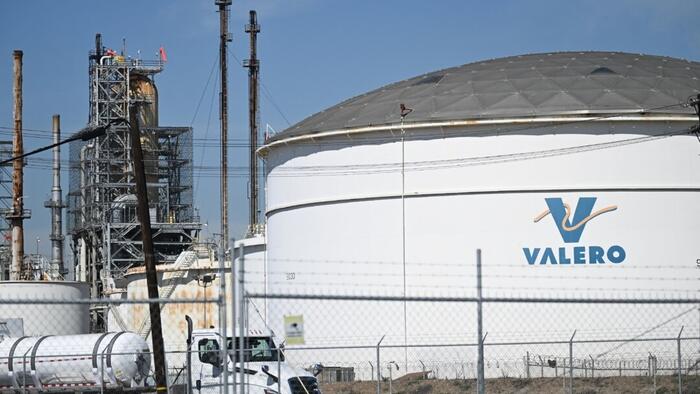
Authored by Beige Luciano-Adams via The Epoch Times,
Amid California’s worsening affordability crisis and warnings of a 75-percent price increase at the gas pump, state legislators over the weekend sent a package of bills aimed at tackling energy costs, fuel supply, and pollution to Gov. Gavin Newsom’s desk.
Newsom announced the deal with state lawmakers last week, and the two chambers extended their session through Saturday to finalize last-minute negotiations before the Legislature adjourns until January.
“After months of hard work with the Legislature, we have agreed to historic reforms that will save money on your electric bills, stabilize gas supply, and slash toxic air pollution—all while fast-tracking California’s transition to a clean, green job-creating economy,” Newsom said in a statement.
Among them is SB 237, which will clear the way for drilling in the state’s Central Valley, home to the state’s largest oil reserves and by far its greatest producer, after legal battles and regulatory restrictions brought production to a grinding halt and sent refineries packing.
By certifying a Kern County Environmental Impact Report (EIR) that has been tied up in litigation for at least a decade, thus temporarily exempting drilling from environmental review, the bill paves the way for approval of up to 2,000 new well drilling permits annually.
Bipartisan support for the measure comes weeks after state agencies briefed lawmakers on California’s impending crisis as mismatched supply and demand threaten to tank a critical phase in its transition to carbon neutrality.
Newsom in April asked the agencies to work with refiners to confront the gap between his climate goals and the reality that demand for transportation fuels is not decreasing as fast as hoped.
It’s an about-face from Newsom’s hardline stance on decarbonization, catalyzed in part by the departure of two refineries and the threat of infrastructure collapse as pipeline capacity reaches critically low levels, and as the state increasingly relies on imported fuel from foreign nations.
Newsom and California Attorney General Rob Bonta in 2023 sued the state’s biggest oil producers for causing or contributing to “climate change-related harms,” including extreme drought, flooding, and wildfires. The case is ongoing.
“I want to thank the Governor for being willing to listen, and to understand the situation that we have before us. And his courage to act immediately to stabilize fuel prices for all Californians,” Republican state Sen. Shannon Grove, who represents Kern County, said on the Senate floor on Saturday.
“Californians cannot afford $10-a-gallon gas,” Grove, who has long pushed to loosen restrictions on production in her district, said in a statement last week. “It’s time to unleash Kern County producers to meet our state’s energy needs with affordable, locally produced oil for Californians by Californians.”
Course Correction
In the Assembly, many Democrats framed the bill as a painful compromise to stave off economic crisis.
“I’m keenly aware of the damage refinery closures can have on a community,” Assemblymember Lori Wilson said during the floor session. Wilson, a Democrat, represents the city of Benicia, home to a Valero refinery that announced it will close by the end of next year.
A Phillips 66 refinery in Los Angeles also announced in October 2024 that it would close by the end of this year, and six refineries have closed since 2008, two of them converting to renewable diesel. Operators have cited high operating costs and punishing state regulations as reasons for leaving; last year, the state fined Valero $82 million for air pollution violations at its Benicia facility.
“This closure will impact our union workers resulting in the loss of $1.6 billion in employee compensation, distress the finances of local governments that will take years to recover, and cost our community $400 million annually in additional economic activity for our local businesses and nonprofits,” Wilson said of the Valero closure.
While the bill won’t help her local refinery directly, Wilson said increasing domestic production of crude oil and lowering imports will help stabilize the market, create and save jobs, and prevent price spikes caused by international market volatility.
Assemblymember Gregg Hart, a Democrat, lauded the final bill for increasing restrictions on offshore drilling, while streamlining permitting for onshore production.
“Together these measures reflect a balanced approach,” he said. “Offshore, we’re tightening oversight to prevent irreparable harm to our coast; onshore, we’re ending 10 years of CEQA litigation and imposing measures and strong setbacks to allow Kern County to manage oil production more efficiently.”
In an Aug. 20 presentation to lawmakers, state agencies acknowledged that the decline in California’s crude supply relative to demand from in-state refineries is in large part a result of the Kern County CEQA litigation that has stalled well permitting in the state’s fossil fuel mecca.
California has some of the highest concentrations of recoverable oil in the world—and also the most stringent oil and gas regulations in the country. Its carbon-rich, heavy crude is refined into finished products, such as gasoline, diesel, and jet fuel, blended into special mixes that adhere to strict environmental standards.
As pipelines carrying Kern County crude to refineries in Northern and Southern California approach critically low levels, the state is aiming to stabilize levels at around 30 percent of overall consumption in order to prevent further closures.
‘Huge Step Backward’
Assemblymembers Alex Lee and Tasha Boerner, both Democrats, were among four “no” votes, calling the bill a “regulatory giveaway to Big Oil,” and a “huge step backward” in the state’s efforts to protect vulnerable communities and workers, respectively.
“Like the dinosaurs that they process into petroleum oil, the fossil fuel industry is a dinosaur. It is dying out, and refineries and facilities are closing not just in California but in Texas and across the world,” Lee said.
He proposed legislators should instead be concerned with “true affordability” and with the workers and communities that will be left to clean up when producers leave as demand inevitably continues to fall.
Democratic Assemblymember Carl DeMaio said he “struggled” with the bill because it doesn’t go far enough to ensure affordable energy supply but represents a “compromise” that tries to balance competing perspectives.
“My hope is we can do better next year,” he said.
Assemblymember Isaac Bryan, also a Democrat, acknowledged the threat of volatility created by mismatched supply and demand, but framed his support as a temporary compromise that meets the moment.
“When the governor first announced his proposal, we didn’t just take it at face value, we pushed back,” Bryan said. “The idea of exempting oil drilling from CEQA was insane to men … but we recognized the pragmatic approach to looking at this problem and needing to find some sort of balance to manage our decline.”
Democratic Assemblymember David Alvarez acknowledged that the bill represents a “course correction” for Democrats, after years of pushing rapid decarbonization.
“This approach we’ve been taking is not the exact right path, and that’s OK,” he said. “It’s a recognition that the utilization of oil is something that’s still necessary … and unfortunately for many people in the state like communities I represent, they cannot afford the transition, because they cannot afford to buy a new vehicle that is nonreliant on gasoline—that is a reality.”
For Grove, bipartisan support for the bill was a gratifying culmination of years of work trying to push back against what she characterized as a suffocating policy that put her constituents at risk.
“This issue is very close to my heart,” Grove said, noting that when she was first elected to the State Assembly in 2010, 3,000 new drill permits were issued and average gas prices hovered around $3.12 a gallon. “Jobs were abundant, families were buying their first home or forever home, nonprofits were funded, my district was thriving.”
But in the past three years, she added, fewer than 87 new drill permits were approved.
“As these permits dried up over the years, thousands of my constituents lost great jobs. … They lost homes, moved away, chased industry to … other locations,” she said.
Democratic state Sen. Jerry McNerney, meanwhile, stressed the ultimate goal of the compromise: “If we don’t keep gas prices affordable, we will lose public support, and in doing so, we will lose the fight against climate change.”
In a press conference with Grove after the Senate passed AB237, retired Kern County Planning Commissioner Lorelei Oviatt said county leaders were excited that 15 years of work that went into creating the EIR was coming to fruition.
“This is an important step at stabilizing our gas prices and actually engaging in a long-term conversation of this relationship between clean energy—and Kern County is at the center of that as well—clean energy and demand for fossil fuels,” Oviatt said.
Grove noted the EIR assures mitigations that will result in a zero net carbon increase, “so whatever we put in to pull the oil out, there is no increase in our carbon output,” and that Kern County not only produces 80 percent of the state’s oil and gas but also nearly 60 percent of its wind and solar, and more than 80 percent of its battery storage.
“We are the solution, not the problem,” she said of Kern County.
Other bills in the package aim to increase climate credits on consumer utility bills, expand California’s regional power grid, and improve utility wildfire oversight, as well as expand the state’s Cap-and-Trade program to 2045 and increase air pollution monitoring.
In a statement on Sept. 10, environmental justice and health organizations criticized the governor and legislative leadership for watering down protections in amended versions of the bills.
“The Legislature is also set to approve massive CEQA exemptions for oil extraction in Kern County based on the oil industry’s word but with no guarantee that this will reduce gas prices or ensure stable fuel supply,” the organizations said.
“Once again, these bills continue to make [environmental justice] communities into sacrifice zones for the benefit of industry profit. We are disappointed by the status of these bills and demand that the Legislature and Governor Newsom do more to protect the most vulnerable communities in California.”
Oviatt said the issue would require stakeholders to continue to have “deep, thoughtful conversations,” but added, “first, the consumers need to know that they can get to work and they can pay their electric bills without having to remortgage the house.”
Newsom, who has already approved the package, has until Oct. 13 to sign the bills into law.



